
Yes, I’ve Been Selling My Book
on Dating Apps
Chloé Caldwell on the Unexpected Yet Rewarding Literary World of Hinge
Over the past couple years, I’ve been accidentally moonlighting as a bookseller on Hinge. Selling books on Hinge (and occasionally Tinder, once in a while Feeld) started happening pretty effortlessly, through a few back and forths with a match. I’ve organically sold my book Women at least a dozen times, not only to people I’ve dated, but also to people I match with and don’t end up meeting in person.
When I was younger and less confident in being a writer (and in being gay, but that’s another story), conversations became convoluted and vague and boring as I tried to conceal the fact that I had three hyper personal books about my life out there. On the apps, I normally used my middle name, Simonne, instead of my first name. It wasn’t that I was a known writer—it was that my writing was exposing.
I’d white lie and practice selective telling, saying I taught writing, or worked at a store. Leaving out the biggest part of my life always felt bizarre and wrong, but I did it anyway, because I wasn’t looking at my life holistically. I compartmentalized; if I was dating then I was dating, which was separate from me being a writer.
Of course there were times it slipped through the cracks, if I chatted for a significant amount of time with someone, or stupidly felt I could trust them, I’d admit I was a writer. That’s when things would take a turn; they’d head over to Google.
It was because of less than savory experiences in my twenties, with men, I’d learned to hide. There was one guy I dated who said he’d never be able to be at the reading I was doing (at the bookstore he owned!) because what I was reading would acknowledge other relationships I’d had. When I met the person I’d later marry, his feelings were hurt reading my first book and I’d had to reassure him. There was also a guy years earlier who had found an essay I’d written about doing heroin, so he felt comfortable showing up to our “date” at a coffee shop in the current withdrawal from opiates.
There is something refreshing about bringing your full self to the apps, something relieving about not minimizing or hiding who you are, what matters to you.
But that was over eight years ago. When my book of a toxic love affair between two women, Women, got a glow up this past year, and went from being an underground queer novella on an indie press to being reissued by Harper Perennial—and I was sick of dancing around the topic, holding back, of being humble. I was back on the apps for the first time in over six years. The people I matched with were going to find out I was a writer anyway. Cutting right to it saved time; it showed me immediately if they could hang or not.
This scrappy strategy made sense for this particular book for a few reasons, one being that it was published ten years earlier, and would be coming back into print during Pride Month in June 2024, so it felt relevant. But the main reason I was so comfortable flaunting my book was because it’s a book about a lesbian situationship, something most if not all the lesbians I was matching with had experienced.
The strategy wouldn’t work well with my other books, or my forthcoming book about divorce and infertility and consumerism. It was now or never.
So, while filling out my profile in summer of 2023, I decided to go hard. Not only did I put “writer” who worked at “writer” for my employment, but also:

Originally, I wrote the above to make my group chat laugh. I was raw from an overnight divorce, a marriage that had entirely repressed my queerness. I didn’t have an apartment, and was in my mom’s guest room. I had nothing to lose. I knew it was a flex, and I needed the win. When I showed my profile to my friend Mia, she immediately shot back this photo of her Hinge profile, saying she’d had Women in her profile for years when she’d been single:

That’s how I learned It’s not only me selling my book on Hinge—I owe a lot to my preposterously loyal readers and friends. One of my past students, Gabby Diekhoff, told me:
I’ve convinced three separate Hinge matches to read Women at this point, two of whom I’ve since dumped. My profile says I’m a writer, so people assume I read. They ask for book recs and I always suggest Women because it’s a quick, accessible, and emotionally stimulating read and a narrative that most queer women can relate to on some level, and also selfishly because I use “I have an anecdote in the re-release!” as a flex.
One Hinge match in particular, we’ll call her L, bought the book the same day I recommended it, before we’d even met, then read the entire book in a single sitting so she could discuss it on our first date. We went back to her place after dinner and her fresh copy was prominently displayed on the dresser next to her bed, a move she’s since admitted was meant to impress me. It worked, and she loved the book. A win win.


Someone I dated off and on for a year—who is written about in the afterword to Women, put this in her profile toward the end of our drawn out breakup. She said it led to lots of conversations and potential book sales:

There was a time a few years ago that Mia even had Women in her Lex profile.

When other people have books in their profiles, I’m sure to “like” the photos, too. I’ve seen copies of Rachel Cusk novels and full shelfies, like this one:
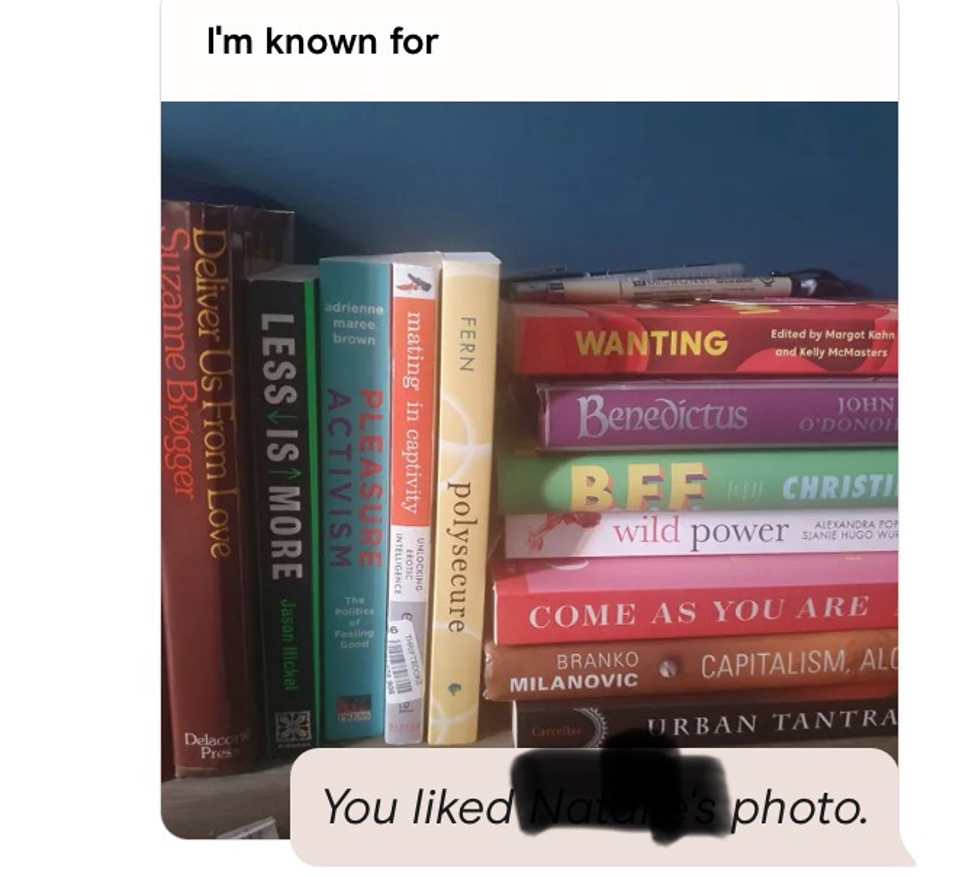
Someone I matched with listed only “Book” as their job, the same way my job says “writer at Writer” which made me laugh. On our first date she gifted me a dyke erotica book A Woman’s Touch. The next day she attended my friend’s book launch that I was reading at. She showed up with her friend who owned the first edition of my book and wanted it signed. At the event, she was the only person to pre-order my other friend’s book. How’s that for a domino effect on book sales? The hustle didn’t end there; I later pressured her into leaving what she’d texted me about my book as a Goodreads review (though she deleted it from her newly made account when we stopped dating and she and her friend with the first edition blocked and unfollowed, respectively, me on Instagram).
On Feeld, someone I matched with opened the conversation by asking to borrow one of my books. She was referencing one of my Feeld photos where I’m looking in the mirror in the green room at Dixon Place in New York, before a reading I did for the Sluts anthology, the bright blue and pink book the main point of the photo.
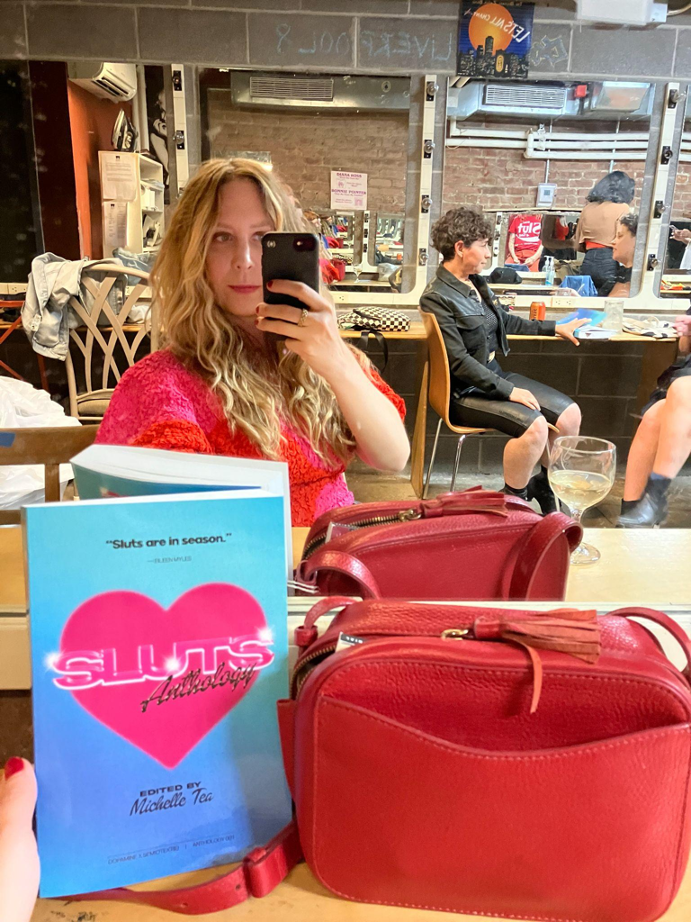
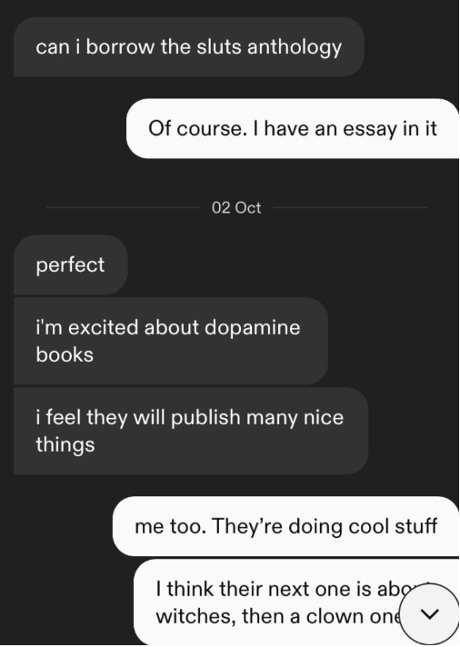
Our schedules were impossible to align for a few weeks, so I offered to send her the PDF of Sluts.
I could buy the book myself, she responded. I’m just trying 2 meet.
That’s cute, I said.
Turns out this match was the writer, LA Warman, and she and I share over dozens of students, both write queer books, and live less than a ten-minute walk from each other. When we finally hung out, drank wine out of jars at the Hudson River, we swapped our books. She went home with my novella and Sluts and I went home with her dyke erotica poetry book Dust. She would have also brought me a copy of Whore Foods, her Lambda Literary Award-winning novella but only had copies in French.
We now talk almost every day, get martinis, go to readings and I catch rides with her to New York City from Hudson. When my dad died, she immediately dropped bottles of wine and cake off at my doorstep and checked in with me every day.
I’ve sold my book to a therapist in Queens I never went on a date with, another person in Queens who canceled our date, a person I dated for a couple months in New Jersey—she bought both Women and Sluts—a person I matched with who said Women had been on her to-do list to buy and now that she had matched with me she would order it. One person put it on hold at the library. These matches send me photos of my book, often on their legs, sometimes in a park, sometimes on their couch.
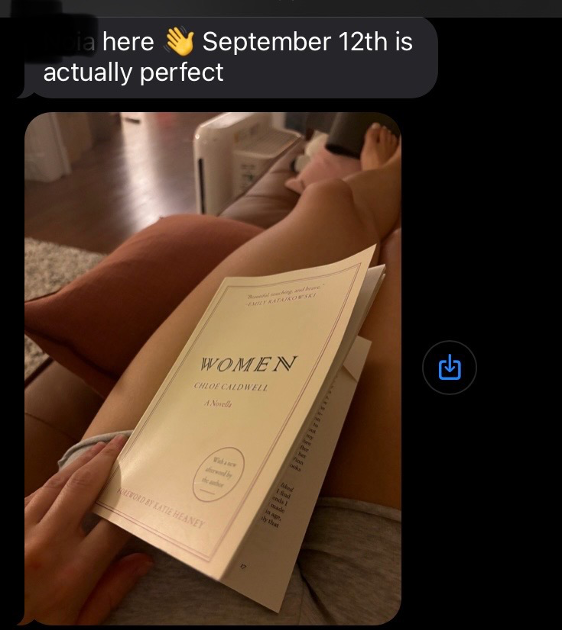
One person even bought the UK hot pink version because she was a self proclaimed “cover snob.” We never went on a date.
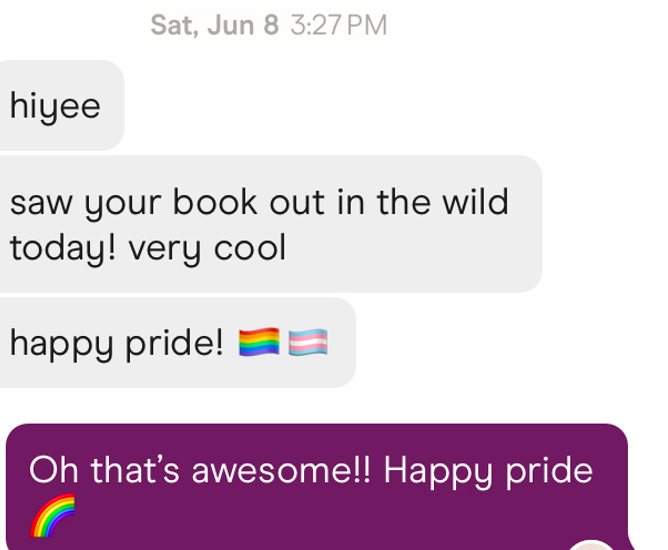
Having your book in your profile is also a way to connect with past readers. Sometimes I didn’t sell a book, but people who’d read it in the last decade would let me know. One person I matched with in summer 2023 was familiar with my work, and since I was reading with some other writers she’d heard of that week at KGB bar, she attended the reading. We never dated or became friends, but she sat with me at the reading, and I noticed she took notes in her journal as people read.
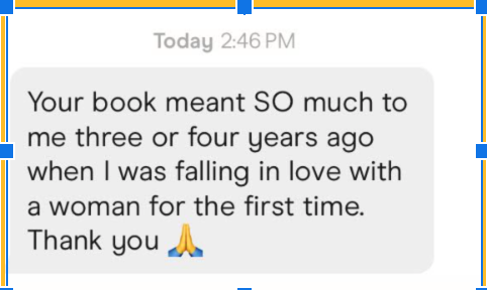
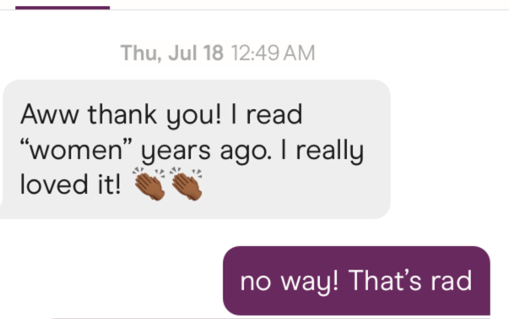
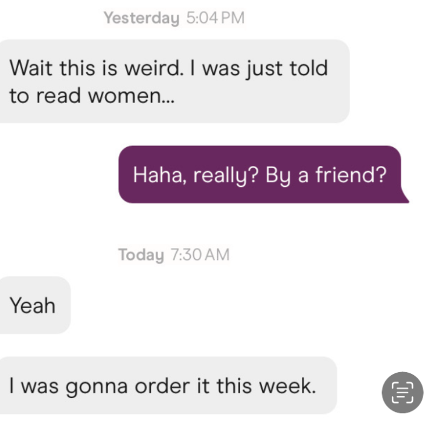
“If I admit I haven’t read your book but I’ve heard of it, is that a red, green or yellow flag?” one person messaged me. “Orange,” I wrote back.
It’s not just my book I sell though, I also move quite a few copies of Entwined: Essays on Polyamory and Creating Home by Alex Alberto. Whenever I come across someone who is forthcoming about polyamory, I recommend it to them, sending a photo or a link via text, since the app doesn’t let you. Everyone always says they’ll order it.
Putting my book in my profile doesn’t feel cocky or weird; it feels like a conversation starter.
Studies show that the top two reasons people buy books are 1) the person has heard of the author, and 2) the book was recommended by a friend. Of course, “friend” is being used liberally here, the “friend” might be a bookfluencer, or, as I’ve learned, someone on a dating app. Last winter I was at a yoga retreat in Costa Rica and the woman next to me at the pool was reading I’m A Fan by Sheena Patel, which was a book I blurbed. I asked her how she’d learned about it and she said a BookToker she followed had good things to say about it so she bought it immediately.
The book thing also gets me out of the kind of interview small talk type conversations that the app lends itself to. Instead of the dreaded “What’s your happy place?” or “Do you have any favorite spots?” and “How would your friends describe you?,” we are already discussing something more niche. Recently I saw someone’s profile, and under the prompt “My simple pleasures”, the person had written “Carmen Maria Machado books.”
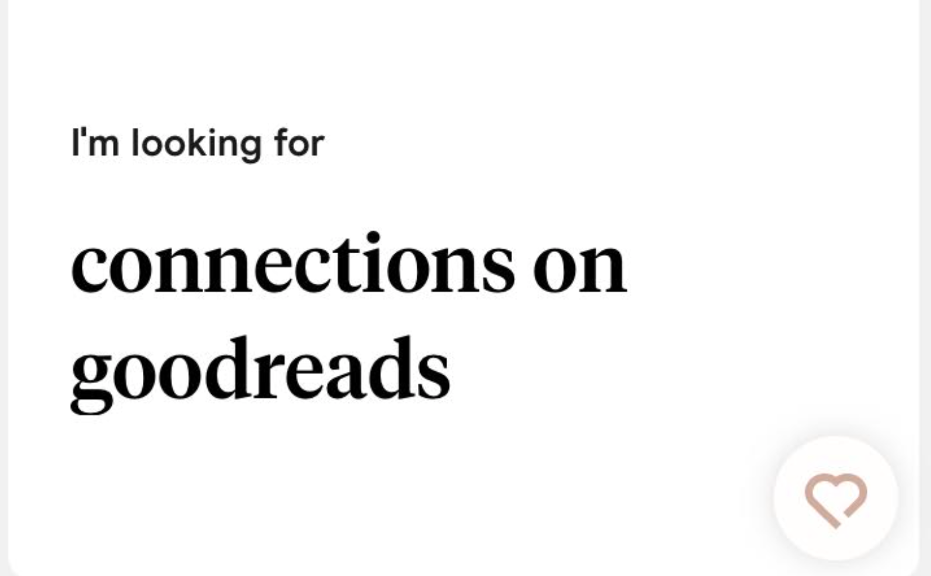
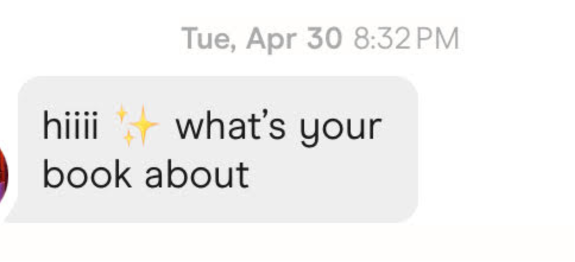
Of course, having my book in my profile is mood dependent, it isn’t a rule. Sometimes I get sick of it, or feel cringe or bored by it. I’ve tried other strategies, too, such as having a photo of the book itself laid on a bed with my hair, or the photo where I’d written on the cover in pen “a lesbian thriller.” Another time I put a graphic my publisher was using as promo. One person even wished me a happy book release day and ordered copies for her friends. We’d never even met in person, and it was a reminder that there are genuinely kind people out there.
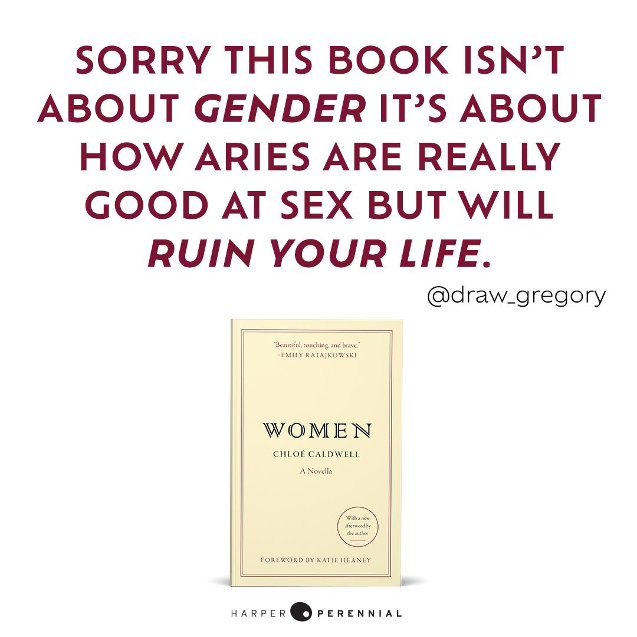
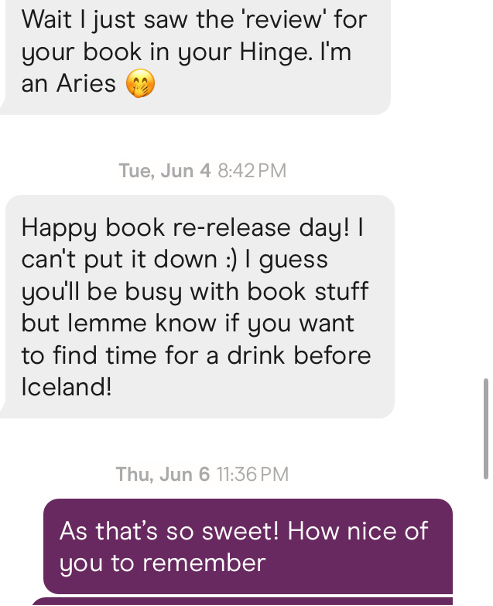
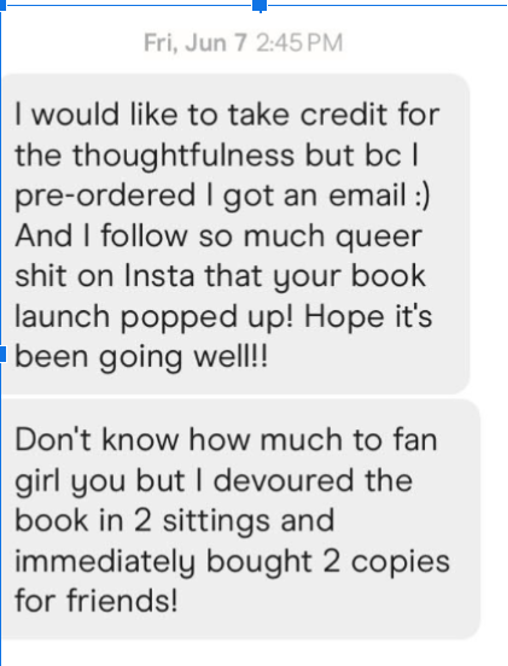
Other times I leave the book stuff out for months at a time. When I do, my messages and matches seem to dry up, so “I wrote the book WOMEN, IYKYK” went back in.
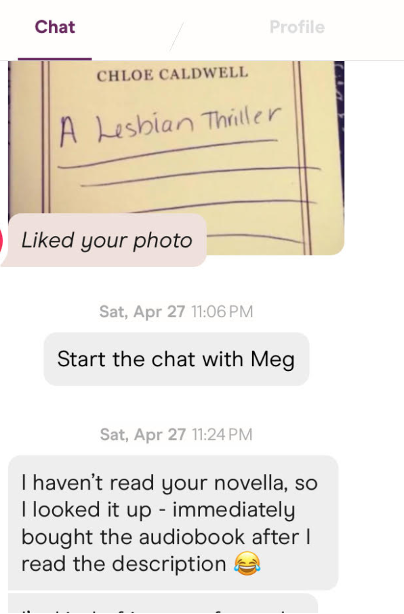
The other night I had a meeting with a student, and I hadn’t even told her about any of this, but her book is poly and local and she said, “Once my book is out I’m just gonna like, put it in my dating apps, like, “Buy my book.” I walked away thinking, damn, I’ve taught her well.
Once, scrolling Hinge, someone’s top photo was one of her holding the novel The Atmospherians by Isle McElroy. I texted Isle:

“Someone on Hinge is holding your book in their top pic!” with a screenshot.
Isle wrote back, “That’s my friend! A couple friends have posted photos with my book for years. Every once in a while, I get texts from friends who tell me someone is posing with my book. It’s always a nice surprise. I can’t say how well it promotes the book, but it’s nice to know that the cover is still showing up in people’s feeds!”
On the apps I am open minded, I am not looking for a writer or someone in the arts, necessarily. Most people I’ve met and even dated off Hinge work in tech. But their appreciation or lack thereof of the arts is important. I am more likely to hit the heart button on someone who has a book in their hand in a photo over a cocktail or a puppy (I know—I’m a monster).
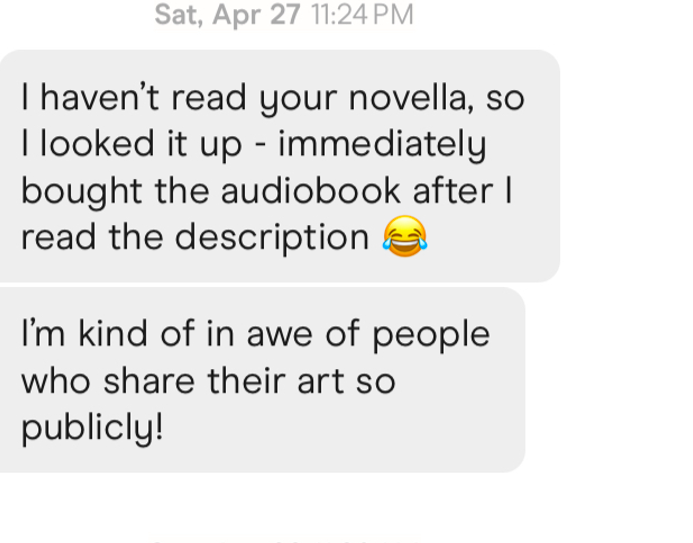
There is something refreshing about bringing your full self to the apps, something relieving about not minimizing or hiding who you are, what matters to you.
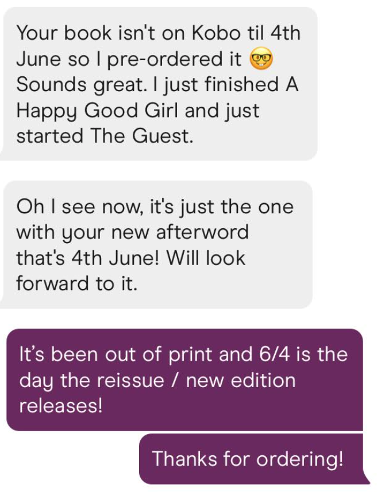
In my profile recently, for the prompt What’s Your Favorite LGBTQ+ book? I wrote Playboy by Constance Debré. I matched with someone, and she told me she read that book too, and how affected by it she was.
“My actual favorite LGBTQ+ book is Love Me Tender by Constance Debré,” I told her, in the spirit of radical honesty, “but the title seems too vulnerable for Hinge, so I put Playboy in my profile instead.”
“HA! How quickly you admitted that is a green flag!” she said. “Literary posturing is the ONLY form of acceptable posturing!” She told me her favorite book she’d read that year was Mrs. S by K Patrick. I’d had that book lying around for over a year, but hadn’t picked it up. Her passionate thoughts on the book made me finally read it, and it became a top favorite for me, too. Months later, I ended up buying another copy of Mrs. S and sent it as an apology to someone I’d dated from Hinge and ghosted for two weeks.
Books are energy in tangible form, and energy gets passed around, moves through people and places. Putting my book in my profile doesn’t feel cocky or weird; it feels like a conversation starter. It’s not about book sales or pre-orders or reviews; it’s about community and connection. I’ve heard people say they just use the apps to get more Instagram followers, so why not use it for more literary community? These days, I’m putting a stack of my favorite books as a photo in my profile, instead of Women. I can’t wait to see what literary adventures come of it.
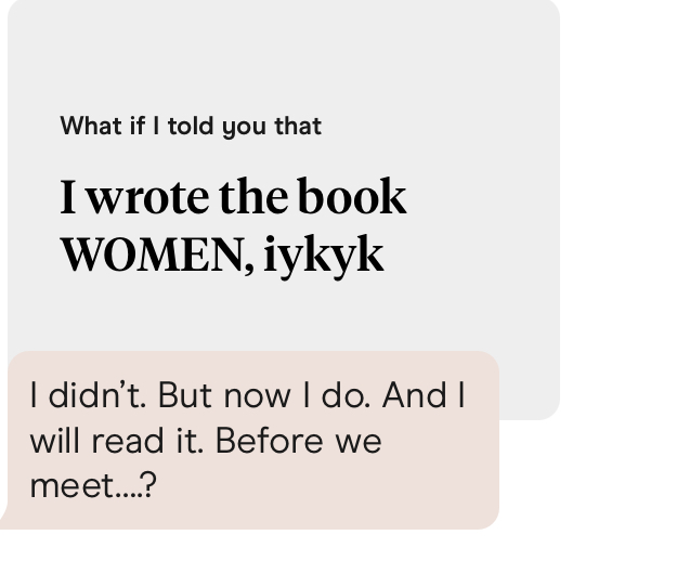
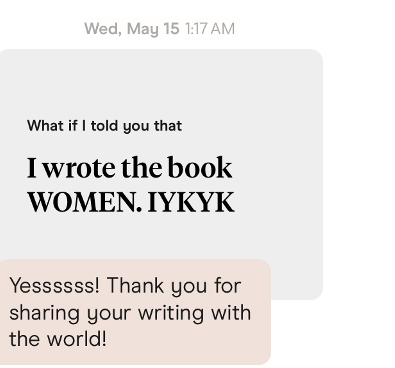
Chloé Caldwell
Chloé Caldwell is the author of the bestselling novella Women. Her next book, Trying, is forthcoming from Graywolf on August 5th, 2025. She is also the author of I’ll Tell You in Person and Legs Get Led Astray. Her essays have been published in the New York Times, Vogue, MSNBC, Bon Appétit, and the anthologies Goodbye To All That, Without A Net, and Sluts. Chloé lives in Hudson, NY and offers writing support at www.scrappyliterary.com












